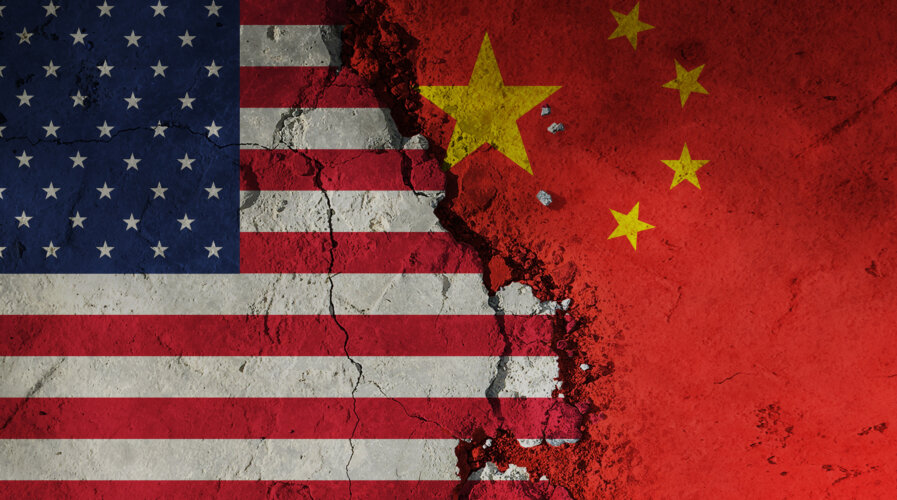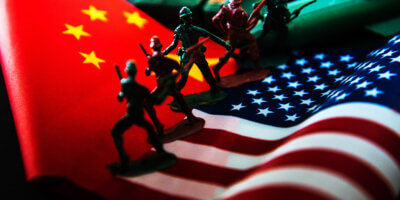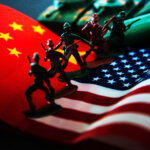
US to tighten chip export restrictions on China, grants three chip giants indefinite waivers.(Source – Shutterstock)
How should nations respond to US-China measures?
|
Getting your Trinity Audio player ready... |
Article by Professor Emre Alkin, Rector, Topkapi University, Türkiye
The strategy of targeting Chinese firms by the United States and its allies during the Trump Administration may have started with Huawei. However, the economic impact has ultimately affected many countries including my own, Türkiye.
Protectionism is a method that countries resort to when they feel threatened by other states. Looking at history, I find it difficult to find any evidence showing that such behavior has ever helped an economy. The influential philosophers of economic history encouraged humanity to embrace and promote international cooperation and collaboration. Today, the largest exporters in the world are China and the US, but they are also the top two importers. While the US exports a wide range of products and technology to the world, thousands of Western companies have manufacturing bases in China. In fact, US companies sell more than half of what they produce in China to the US.
The Economic Cost

Professor Emre Alkin, Rector, Topkapi University, Türkiye
According to Reuters, BT, Britain’s largest mobile and broadband company, spent nearly 500 million pounds to remove Huawei’s equipment from its EE mobile network. Similarly, Vodafone spent 200 million euros, while Deutsche Telekom might have to spend billions to replace Huawei antennas. Following bans enacted by the US government, it thought that the cost of removing Huawei equipment would be around $1.9 billion. However, this whole swap is now expected to cost $5.6 billion, a price greater than the later revised US Congress estimate of $5.3 billion. Canadian PM Trudeau eventually instructed operators to remove telecommunications equipment made by Huawei. Trudeau was reluctant to contribute to cover the cost of around 1 Billion Canadian Dollars for removal. As a result, European telecom operators in Canada sued the government and the issue still remains unresolved.
Competition is said to drive people to do better. Technology, on the other hand, may help reduce production costs, allowing producers to sell their goods and services at more reasonable prices. But, when market forces are distorted, pressure on an economy can result in inflation. The Huawei ban led to price increases across the EU as industries including agriculture, mining, aviation and others felt the impact of the restricted access to 5G technology. Here are the estimated amounts some countries have to spend each year in the absence of Huawei in their 5G deployment: Germany 479 million euros, France 447 million euros, the United Kingdom 374 million euros, and Spain 292 million euros.
Delaying 5G delays technology
Telecom operators and internet service providers will pass on the rising costs to customers, for communication, which is increasingly considered to be among the most basic rights of human beings today. Analysts say that removing Chinese infrastructure made the 5G infrastructure in Europe $55B more expensive and delayed it by one and a half years.
Based on my observations, 5G investments are being postponed one by one due to soaring costs. Since people do not want to pay money for an expensive service, operators and providers will suspend their investments in 5G connectivity. This big delay in building and deploying 5G technology will cause developed countries to fall behind in the technology.
These countries will suffer serious GDP losses. The United Kingdom, for example, is estimated to lose in excess of 7 billion pounds of GDP due to the delay of 5G deployment while GDP in France is expected to decline by 7.3 billion dollars for the same reason.

Both countries actually need each other a lot more than they realize. (Source – Shutterstock)
More Cyber-attacks and Financial Losses
When the ban was imposed on Chinese technology, did the cyber-attacks stop? No, they did not. In 2021, five billion attacks took place in Europe, with an increase of 495% compared to the previous year.
The decisions of the former president of the United States Donald Trump, caused the US Semiconductor Industry a 7 billion dollar loss of sales in 2021. The market values of some US companies working with Huawei have also decreased causing investors to lose money.
Although there was a significant decline in Huawei’s sales during the first year of the ban, its’ network infrastructure market share remained relatively stable. The company continues to innovate with new products, services and solutions. Huawei committed 25.1% of its annual revenue to R&D investments in 2022.
China advocated strategic autonomy for high tech as early as 2006 but progress was slow. China had been able to rely on high-tech products from the United States. The US sanctions on Huawei sounded an alarm for the Chinese government and businesses, making it not only necessary but also urgent to invest in advanced technology and processes.
Solving Türkiye’s Challenges
As for Türkiye, it is not easy to install a 5G network infrastructure in a country with mountains higher than Mont Blanc. Through pragmatism towards the United States, Türkiye wasn’t forced to suspend its trade relations with Russia and China. Considering Huawei’s previous experience in 5G network installation in extreme terrain, the Chinese tech giant seems like the most suitable “solution” for Türkiye.
The top item among Türkiye’s imports from China is communication equipment, unsurprisingly followed by phones and electrical devices, while industrial machinery and devices occupy the third spot, all of them totaling billions of dollars. But it should be noted that Türkiye also sells items to China in the same categories. There is an established cooperation between the two countries. Obviously, China runs a strong trade surplus against Türkiye but we are not intimidated by this giant surplus and have a pragmatic approach towards the needs of our country. Türkiye needs at least 2 million km of fiber optic network and microwave technologies to switch to 5G. Due to frequent earthquakes, almost every city in the country, particularly Istanbul with millions of habitants, needs to be transformed into “smart cities” for emergency communication and management. So, Türkiye needs companies like Huawei or other partners that can help it to develop.
Türkiye’s total R&D investments are only one-third of Huawei’s, which means that, despite US pressure, the country makes decisions based on its own realities. In Türkiye, Huawei is not considered a mere mobile phone brand, but rather a technological solution partner. At a time of global uncertainty, collaboration and communication are essential to get us through tough times.
About the author
Professor Alkin is Rector of Topkapi University and teaches economics. He graduated in Economics and English from Istanbul University where he became a research assistant at the Istanbul University Faculty of Economics before becoming professor in 2002. He has written 14 books about risk management and financial institutions as well as holding board positions for several investment companies and industry organizations. Professor Alkin is a regular economic commentator for TV Channels such as TV8, FOX, CNNTURK and CNBC-E where he shares his industry experience with energy, GSM and telecommunications, international financial institutions, insurance, iron and steel, and payment systems. Prof. Alkin is a columnist for the business newspaper Dunya and Türkiye.
The views in this article are those of the author and may not represent the views of Tech Wire Asia.
READ MORE
- Safer Automation: How Sophic and Firmus Succeeded in Malaysia with MDEC’s Support
- Privilege granted, not gained: Intelligent authorization for enhanced infrastructure productivity
- Low-Code produces the Proof-of-Possibilities
- New Wearables Enable Staff to Work Faster and Safer
- Experts weigh in on Oracle’s departure from adland


